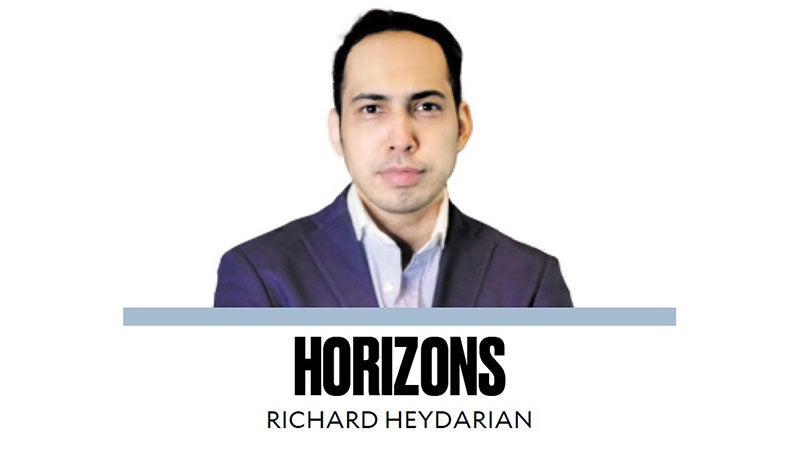Marcos, Marxism, and the Pink Movement

Between consent and force stands corruption, which is characteristic of situations when it is hard to exercise the hegemonic function and the use of force is too risky,” warned Italian thinker Antonio Gramsci a century earlier. Confronting the specter of fascism, Gramsci emphasized the need for building a broad, inclusive, and robust coalition of progressive-liberal forces to stem the tide of violent reactionary politics.
Gramsci’s genius lay in his ability to dispense with sloganeering, ideological posturing, and deterministic pseudo-scientific theories in favor of pursuing an organic, tactically savvy, and strategically consequential strategy for progressive forces in moments of political crisis. Accordingly, he rejected all sorts of reductionist paradigms—namely vacuous ”moralism” (reducing political to moralistic judgments), ”economism” (reducing everything to gut issues), and parliamentarism (reducing everything to the contestation of elected office)—in favor of a philosophy of ”praxis.”
For Gramsci, politics in modern democracies is ultimately about ”winning the consent” of the people through the art of persuasion, mobilization, and cultural enmeshment. Crucially, he advocated for the creation of a new ”hegemonic bloc”: a robust coalition of like-minded forces undergirding a constellation of ideas and practices that create and preserve a new political order altogether.
Arguably, no thinker is more relevant to understanding the challenges of our current political moment than Gramsci, a journalist-activist who perished in Mussolini’s dungeons while heroically making sense of his political zeitgeist. Even Italy’s current post-fascist leader, Giorgia Meloni, is apparently a big fan of Gramsci. Having recognized the genius of his analysis of modern politics, Milan-based writer Giorgio Ghiglione writes, “[Melloni] is convinced that the Italian left has succeeded, since the end of World War II, in dominating cultural institutions … [and] [n]ow that she’s in power, she’s determined to reverse that imbalance.”
Although Italy is clearly a nation on a different level of economic development than ours, it shares a lot with the contemporary Philippines—a Catholic-majority society, a besieged liberal elite, a marginalized political left, and a resurgent right-wing populist leadership.
Inspired by Gramsci’s insights, I have spent the first weeks of the new year engaging folks across the progressive-liberal spectrum. In Bicol, I had the opportunity to exchange views (albeit briefly) with Liberal Party stalwarts such as former senators Leila de Lima, Bam Aquino, and Kiko Pangilinan as well as dozens of Catholic priests from the local dioceses. Crucially, had extensive discussions with anti-corruption economist Dr. Cielo Magno as well as progressive sociologist professor Walden Bello. For a more tactical-situational understanding of current politics, meanwhile, had multiple podcast episodes and off-the-record exchanges with former political affairs secretary Ronald Llamas.
The basic question at the heart of my exchanges was this: What should the genuine opposition do amid the festering yet indeterminate tug-of-war between the House of Marcos and the House of Duterte? Currently, there are two types of risks: some progressives may inadvertently end up as de facto allies of the administration by zeroing in on the impeachment of Sara Duterte, while others may end up as unwitting enablers of the Dutertes by primarily focusing on the anomalies, most notably, the recently passed controversial budget under the current administration.
A Gramscian perspective, however, provides a dialectical way out of this seemingly impossible dilemma. To begin with, it’s crucial for the genuine opposition to focus on ”the greater evil,” namely the side that has not only been behind alleged corruption throughout the decades but also widespread extrajudicial killings and potentially treasonous deals with Zhongnanhai in more recent years. But this doesn’t preclude the opposition from fiscalizing the excesses of the current administration. It’s not mutually exclusive.
Genuine opposition can adopt a dynamic approach, whereby it adopts a ”war of maneuver” against the Dutertes, namely supporting potential impeachment and International Criminal Court trial against relevant members of the notorious while adopting a ”war of position” of gradually building up its momentum and political capital to serve as an effective check on any excesses by the current administration until 2028.
Ultimately, the genuine opposition should mobilize support, persuade new constituencies, nurture changemakers, embrace decisive leaders, and organize well ahead of the next presidential elections. Nothing seems as promising as reviving the ”Pink Movement” with greater focus on early mobilization, an inclusive campaign narrative, and a practical yet progressive policy agenda that could win the consent and votes of the majority of the Filipino voters.
—————-
rheydarian@inquirer.com.ph


















